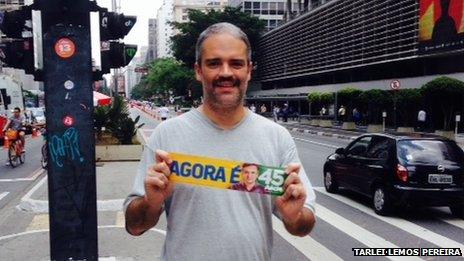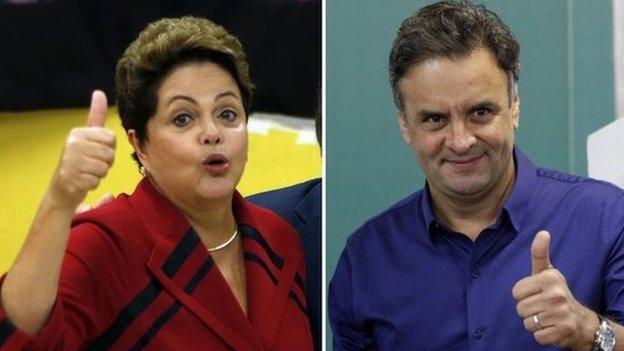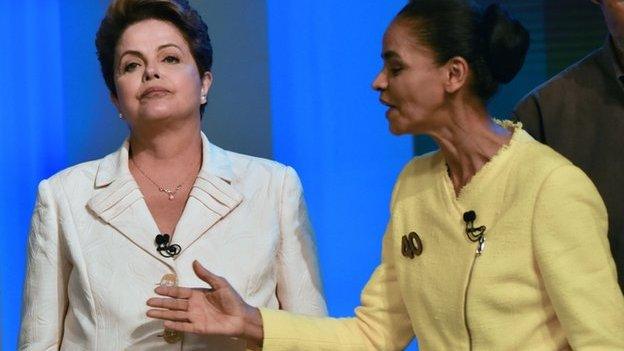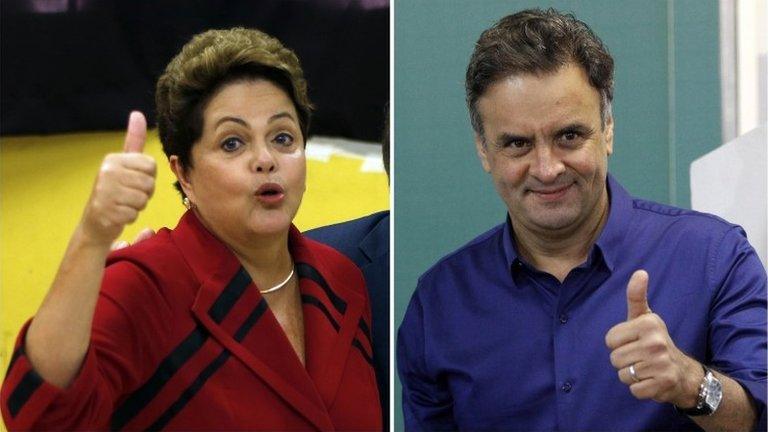Brazil elections: Meet the voters
- Published
Brazilians are casting their votes in the second and final round of the country's presidential election, with the contest expected to be the closest for many years.
The incumbent left-leaning President, Dilma Rousseff of the Workers Party (PT), faces centrist Aecio Neves of the Brazilian Social Democracy Party (PSDB) in the second run-off round.
Both candidates have pledged to kick-start Latin America's largest economy and make it more competitive.
Meet some of Brazil's voters as they share their views.

Angelica Mari, Sao Paulo
Despite it being an exciting couple of months of political campaigning - people have discussed politics more than I have seen in my lifetime - I am looking forward to the conclusion of this and seeing the outcome, whoever gets chosen.
.jpg)
"Lefties like me are a minority in this right-wing stronghold of São Paulo"
I live in a very right-wing area of Sao Paulo state and lefties like me are a minority. You get judged and frowned upon not only on social networks but also in the "real world". I was at a book launch by a bunch of artists and writers recently and Aecio supporters would walk past mumbling words of disdain - as if we didn't want see a better country ourselves.
It scares me that we have managed to elect what is the most conservative congress probably since the dictatorship: extremist religious leaders, policemen, homophobes, gun freaks... you have it all.
It's a shame that Luciana Genro - my candidate in the first round - is no longer in the presidential race as I identified with her proposals a great deal more. But Brazil isn't ready for someone like her - at least not yet.
Today, I will vote for Dilma Rousseff. But I hope that that she will have the guts to be more daring and implement the changes people - and I mean every Brazilian - want to see: More investment in health and education, less bureaucracy and better conditions to do business, and of course, less corruption.
But the fact is that the poor are still the majority and we need a government that focuses on them. The rich don't seem to understand that more equality will lead to less crime, more prosperity and more justice for all.

Tarlei Lemos Pereira, Sao Paulo
I think Brazil deserves much more.

Corruption is a cancer here, something simply unacceptable. There is no real democracy with corruption. We're living a false democracy.
Our economy isn't growing, health and education services are extremely poor. I will vote against the incumbent president. Hopefully, the challenger will win this election.
I'm quite worried about the corrosion of Brazil's institutions after 12 years under PT. Members of PT are currently serving their sentences in penitentiaries but corruption is part of the Brazilian politicians' culture.

Daniel Viotti, Belo Horizonte, Minas Gerais
.jpg)
Children with Dilma stickers in Brazil. Photo taken by Daniel Viotti
I'm 20, I study law and live in the city where both candidates were born and where the competition is fierce.
There were a lot of demonstrations here, my mother and I were very involved with them.
I am supporting Dilma Rousseff for the re-election because I think that Brazil has changed a lot in the past 12 years, especially for the poorest people, but also in terms of the opportunities for the middle classes.
.jpg)
The government claims that more than 20 million jobs were created and the minimum salary has real growth in this period. In the 2008 crisis, Brazil kept growing and the workers were not harmed.
My city is divided in the half by supporters. Generally, the poorest people - who depend more on the government for health, education, transportation and life quality - vote for Dilma; and the richest people in the central part of the city vote for Aecio.
The atmosphere is like the World Cup finals. In the street there are people dressed in the candidates' colours and using flags.
But there have been a lot of sad situations with angry people attacking supporters of the other party. A lot of people are afraid and anxious about the results.
Dilma brought more people to the street. In Recife, the capital city of the poorest region of Brazil, more than 50,000 people turned out to support Dilma. This kind of mobilization and support is not usual here and it happened because the people of Brazil realised the improvements made to their life and country and don't want to lose the gains.
I hope that one day we have a country with more social equality, in which all the people have the same opportunities to study, work, be healthy and happy; and with no more miserable people.

Gerson Lima Neto, Recife
.jpg)
The main reason in my view why people are now turning to Aecio (even in the northeast region) is the huge corruption allegations facing the 12 years of PT ruling.
The overall sentiment is that perhaps Aecio is not the best candidate, however we need to change direction in many areas and if Aecio fails, we always have the opportunity to change again in 4/5 years... the main goal is remove PT.
Produced by Victoria Park
- Published26 October 2014

- Published13 October 2014

- Published6 October 2014

- Published6 October 2014
